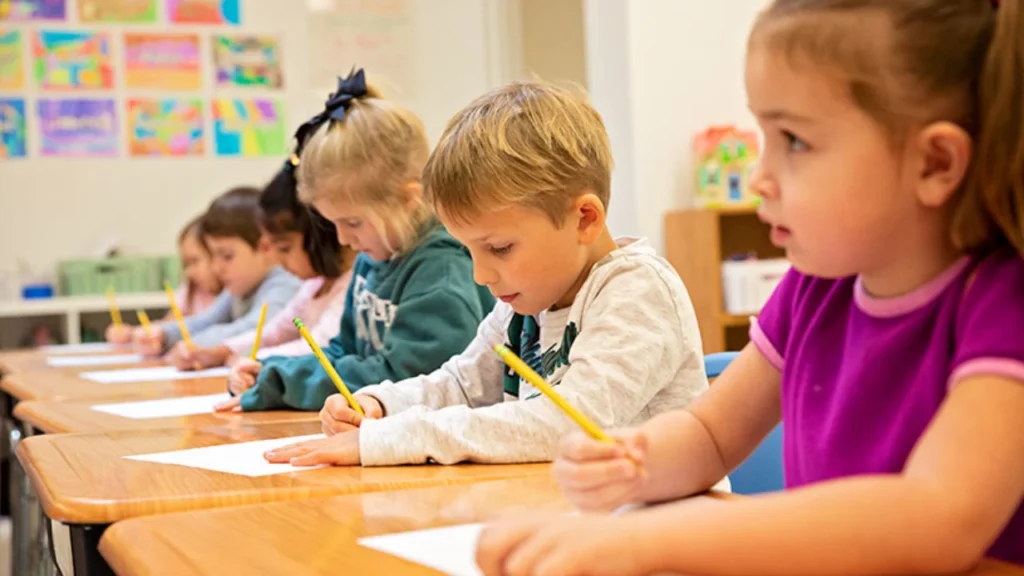![From Playtime to Prime Time: How Murfreesboro Day School Shapes Bright Futures Introduction: The Crucial Role of Early Education Early childhood education is the cornerstone of a child’s intellectual, social, and emotional growth. It is during these pivotal early years that the […]](https://dayschools.org/mca/wp-content/uploads/2024/09/New-Project-20.webp)
Table of Contents
Introduction: The Crucial Role of Early Education
Early childhood education is the cornerstone of a child’s intellectual, social, and emotional growth. It is during these pivotal early years that the architecture of the brain is most malleable—responding rapidly to the environment, relationships, and stimuli children are exposed to. The experiences children have from birth to age five serve as the blueprint for all future learning, behavior, and health.
At Murfreesboro Day School, this critical developmental window is treated with the intentionality it deserves. The school’s approach to early education is not merely about meeting milestones; it’s about exceeding them through thoughtfully curated experiences that awaken curiosity, encourage exploration, and instill confidence. Rather than a custodial setting, Murfreesboro Day School is a vibrant, responsive community that equips children with the tools to thrive not only in school, but in life.
Research consistently shows that high-quality early education improves a child’s readiness for elementary school, reduces the likelihood of academic remediation, and strengthens social competence. By investing in a strong foundation, Murfreesboro Day School helps ensure that students don’t just keep pace with their peers—they lead the way forward.
The Philosophy Behind Murfreesboro Day School’s Educational Approach
Murfreesboro Day School is guided by a forward-thinking educational philosophy rooted in the understanding that every child is a unique individual with a natural desire to learn. Education here is not one-size-fits-all; it is intentionally designed to honor each student’s developmental stage, learning style, and innate strengths.
The school’s educators believe that children learn best in environments that are warm, responsive, and intellectually stimulating. Classrooms are not static spaces, but dynamic hubs of discovery where inquiry is encouraged and ideas are nurtured. Learning is hands-on, immersive, and deeply connected to real-world concepts, giving students a meaningful context for their developing skills.
At the heart of the school’s approach is a commitment to developmental appropriateness. This means curricula are aligned with the cognitive, emotional, and physical capacities of the children, ensuring that they are challenged just enough to spark growth, but not so much as to cause frustration. Educators serve as guides and co-learners—fostering trust, igniting curiosity, and encouraging autonomy.
Moreover, Murfreesboro Day School’s philosophy is rooted in the belief that learning should be joyful. Children are given the freedom to play, experiment, and take intellectual risks in a safe, supportive environment. This joy-centered learning cultivates a positive association with school from the earliest years, laying the groundwork for a lifelong love of learning.
By balancing academic readiness with emotional well-being and creative expression, Murfreesboro Day School prepares students not only for the next stage of education, but for a life marked by adaptability, empathy, and purpose.

Creating Foundations: Cognitive Development through Play-Based Learning
Cognitive development in young children does not occur in isolation—it is deeply intertwined with movement, interaction, and imaginative engagement. At Murfreesboro Day School, play-based learning is not simply a pedagogical preference; it is a scientifically supported strategy for activating higher-order thinking in young minds.
In practice, this approach translates into a classroom environment that is rich in open-ended materials, exploratory centers, and guided group activities. Children are invited to build structures, create stories, sort objects, and experiment with cause-and-effect scenarios. Whether constructing a block tower, navigating a sensory bin, or dramatizing a story, students are developing skills in categorization, sequencing, memory retention, and symbolic thinking.
This active engagement fosters the mental dexterity required for more complex academic tasks later on. Importantly, children learn to hypothesize, test, and revise their ideas—critical elements of scientific reasoning. The hands-on nature of this approach also supports executive function development, strengthening focus, impulse control, and working memory.
Educators act as keen observers and facilitators, skillfully extending play with open-ended questions and intentional prompts. This scaffolding transforms spontaneous play into rich cognitive challenges. At Murfreesboro Day School, play is not a diversion from learning; it is the very engine of intellectual growth.
Fostering Emotional Intelligence: Nurturing Empathy and Social Skills
Emotional intelligence is increasingly recognized as a more accurate predictor of long-term success than IQ alone. Murfreesboro Day School integrates the development of emotional acumen into every facet of the educational experience. Children are encouraged to identify and name their emotions, creating a vocabulary of feelings that empowers them to express needs constructively and understand others’ perspectives.
Classroom routines incorporate daily social-emotional learning (SEL) moments, from circle time discussions to conflict resolution strategies. Role-playing, storytelling, and cooperative activities provide children with authentic opportunities to practice empathy and social problem-solving. In these interactions, they learn to listen actively, negotiate respectfully, and appreciate diverse viewpoints.
Teachers model emotional regulation, offering gentle guidance during moments of frustration or excitement. They also intentionally celebrate prosocial behaviors—such as helping, sharing, and comforting peers—reinforcing positive emotional habits. Over time, this emotional scaffolding leads to increased self-awareness, self-control, and a strong internal moral compass.
The emphasis on emotional literacy doesn’t just prepare students for kindergarten—it equips them to become compassionate leaders, effective collaborators, and resilient individuals capable of managing life’s inevitable challenges with grace and confidence.
Physical Development: Encouraging Motor Skills and Wellness
Young children learn with their whole bodies. At Murfreesboro Day School, physical development is seamlessly integrated into the daily rhythm of learning, supporting the vital connection between movement and brain development. Whether through structured physical education or free outdoor play, children are continuously refining both gross and fine motor abilities.
Outdoor spaces are designed for more than recreation—they are active learning environments where children can climb, balance, jump, and run. These activities strengthen core muscles, enhance coordination, and develop spatial awareness. Meanwhile, classroom activities like cutting, drawing, pouring, and threading beads help fine-tune the dexterity and precision needed for writing and other academic tasks.
Physical wellness is also a key tenet of the school’s philosophy. Children are encouraged to make healthy choices through lessons on nutrition, hygiene, and mindfulness. Movement breaks are thoughtfully incorporated to optimize focus and reduce stress, ensuring that children are both physically energized and mentally alert.
In recognizing that a healthy body underpins a healthy mind, Murfreesboro Day School ensures that physical growth is not sidelined—it is cultivated with as much care and intentionality as cognitive and emotional development. This holistic view of wellness promotes lifelong habits of vitality, agility, and self-care.

Personalized Learning: Catering to Unique Strengths and Interests
Every child is a singular combination of interests, abilities, learning styles, and developmental rhythms. At Murfreesboro Day School, personalized learning is not a trend—it is a foundational principle embedded in the culture of the classroom. Educators are attuned to each child’s unique profile, creating a responsive environment where individual potential is recognized and cultivated.
From the earliest interactions, teachers observe how children engage with tasks, what captures their attention, and where they naturally excel. This insight informs differentiated instruction, allowing educators to adjust pacing, content, and methods to match each learner’s needs. For example, a child with a strong visual-spatial orientation may be encouraged to explore concepts through drawing or building, while a verbally inclined student might thrive through storytelling and conversation.
Importantly, personalized learning at Murfreesboro Day School is also about honoring student voice. Children are given choices in their learning activities, fostering autonomy and a sense of ownership. This sense of agency deepens engagement and reinforces the idea that learning is not something done to them, but something they actively shape.
By supporting individual strengths while addressing challenges with compassion and strategic intervention, the school creates a nurturing ecosystem where each child can flourish—academically, socially, and emotionally. This personalized approach lays a powerful foundation for lifelong learning, adaptability, and self-confidence.
Curriculum Innovation: Integrating STEAM from an Early Age
In an increasingly complex and technology-driven world, early exposure to STEAM disciplines—Science, Technology, Engineering, Arts, and Mathematics—is critical. Murfreesboro Day School rises to this challenge with a forward-looking curriculum that introduces these interconnected subjects in a manner that is both developmentally appropriate and intellectually invigorating.
Children at Murfreesboro Day School are not passive recipients of information; they are active investigators. STEAM concepts are embedded into daily learning through hands-on experiments, interactive tools, collaborative projects, and artistic expression. Whether building a simple machine, observing natural phenomena, or designing an art installation inspired by geometry, students are constantly exploring how the world works and how they can shape it.
The integration of arts into the STEM framework further enhances creativity, problem-solving, and innovation. Artistic endeavors are not treated as secondary to scientific inquiry; they are considered vital contributors to holistic thinking. This interdisciplinary approach nurtures the kind of nimble, inventive minds that are essential in the modern age.
Technology is introduced as a tool for exploration, not distraction. Under careful guidance, children use age-appropriate digital resources to reinforce learning and express ideas. The result is a rich tapestry of experiences that prepare students not just for future schooling, but for an evolving global landscape that demands critical thinking, collaboration, and imagination.
Qualified Educators: Architects of Lifelong Learning
Behind every meaningful learning experience at Murfreesboro Day School stands a dedicated, expertly trained educator. These professionals are more than instructors—they are facilitators of growth, stewards of development, and champions of each child’s journey. Their qualifications are not only academic; they encompass emotional intelligence, pedagogical insight, and a deep reverence for the potential of every learner.
Each educator at Murfreesboro Day School is equipped with specialized training in early childhood education, child development, and age-specific instructional strategies. This expertise enables them to navigate the nuanced stages of early learning with confidence and care. They understand when to encourage independence and when to provide gentle structure; when to introduce complexity and when to revisit fundamentals.
Moreover, the school prioritizes continuous professional development. Educators regularly engage in reflective practice, collaborative planning, and ongoing training to remain abreast of the latest research and best practices in the field. This commitment to growth mirrors the expectations set for students: learning is a lifelong endeavor.
Perhaps most importantly, these educators cultivate an atmosphere of trust and respect. They see each child not as a collection of benchmarks to be met, but as a whole person with infinite potential. In doing so, they model the values of curiosity, perseverance, and empathy—qualities that endure long after classroom lessons are forgotten.

Parental Collaboration: Strengthening the Home-School Connection
Education thrives when it is a collaborative endeavor. At Murfreesboro Day School, parents are not bystanders—they are deeply valued partners in their child’s educational journey. The school recognizes that consistency between the home and classroom environments is essential for reinforcing learning, shaping behavior, and nurturing emotional security.
This collaboration begins with clear, consistent communication. Teachers maintain open lines of dialogue through parent-teacher conferences, digital updates, progress reports, and informal check-ins. These touchpoints are not limited to performance metrics; they include insights into each child’s personality, peer interactions, and learning preferences—fostering a comprehensive understanding that empowers parents to support their child with precision and empathy.
Family involvement is further cultivated through inclusive school events, classroom participation opportunities, and parent education workshops. These experiences create a sense of community and shared purpose, allowing families to feel genuinely connected to the life of the school. Moreover, they offer parents tools and strategies to reinforce academic and social development at home, ensuring continuity in the child’s learning experience.
By forging strong partnerships with families, Murfreesboro Day School creates a unified support system. The result is a resilient, well-rounded child who benefits from a seamless interplay between home and school—a dual foundation that reinforces confidence, curiosity, and character.
Preparing for the Future: Transitioning from Preschool to Primary Education and Beyond
The shift from preschool to primary school is a significant developmental leap—one that, if mishandled, can disrupt a child’s momentum and self-assurance. Murfreesboro Day School approaches this transition with foresight and intentionality, understanding that a child’s early educational transitions often set the tone for future academic adjustments.
Transition planning is woven into the fabric of the preschool experience. From structured routines that mirror elementary expectations to early introductions to foundational literacy and numeracy, children are gently prepared for the academic demands that lie ahead. Simultaneously, they are equipped with the soft skills—focus, independence, emotional regulation—that are equally critical for success in formal schooling.
Orientation sessions and classroom visits to kindergarten settings are thoughtfully integrated into the final months of preschool. These experiences help demystify the next step, transforming the unknown into the familiar. Children participate in reflection activities, celebrate milestones, and engage in conversations about “what’s next,” reinforcing a mindset of readiness and excitement.
Murfreesboro Day School also maintains strong relationships with local elementary programs, facilitating smooth information exchange and personalized recommendations. This level of preparation ensures that children leave not only academically equipped, but emotionally poised to embrace new environments with confidence and enthusiasm.
Conclusion: How Murfreesboro Day School Positions Students for Lifelong Success
Murfreesboro Day School stands as a beacon of excellence in early childhood education—not simply for what it teaches, but for how it empowers. Its intentional, research-backed approach nurtures the whole child, blending academic rigor with emotional intelligence, creative expression, and physical vitality.
From the earliest days of exploratory play to the structured preparation for primary education, every element of the school’s framework is designed to maximize a child’s potential. Through personalized learning pathways, innovative curricula, and meaningful family engagement, students are not only ready for kindergarten—they are ready for life.
The lasting impact of a Murfreesboro Day School education is seen in students who are curious, confident, and capable. These are children who step into the world with the intellectual tools, emotional insight, and adaptable mindset needed to flourish in a rapidly changing world. In shaping these young learners from playtime to prime time, Murfreesboro Day School truly lays the foundation for a bright, successful future.







Leave a Reply